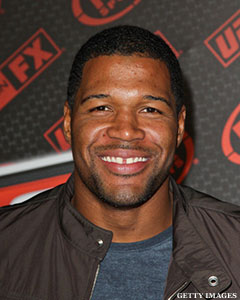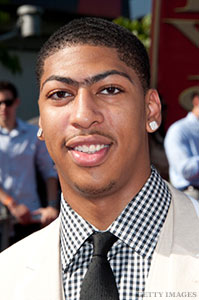A nagging injury, a stutter, a birth defect, or an addiction -- these are things that I refer to as an "It." "It" is something, real or perceived, that we think holds us back from maximizing our potential. For better or worse (which one is up to you), it is also often how we gain identity.
Former 5-3 NBA player Muggsy Bogues and his height. National soccer hall of famer Alexi Lalas and his bright red hair. Golfer Casey Martin and the Klippel Trenaunay Weber syndrome in his right leg. And, of course, Michael Strahan, the gap-toothed wonder, who was just named permanent co-host of "Live with Kelly!" replacing Regis Philbin.

I was on the subway years ago and saw a man with a big gap in his teeth. My friend turned to me and whispered, "He must be related to Strahan. I bet he flosses with a rope." The only saving grace was that the person didn't hear him, but certainly Strahan has heard worse in his day. And what has he done with all those insults about his "it?"
Laughed all the way to the bank.
Strahan's "Live with Kelly!" salary is estimated to be between $5 million and $7 million annually, a nice addition to an already robust endorsement and broadcast income. On his debut as the official co-host, Strahan pointed to the audience and said, "I've never seen so many people with a gap in their teeth. We are now a gap-friendly show."
Not since Alfred E. Neuman's debut in 1954 as the mascot for Mad magazine has a tooth gap been so famous. Sure, Strahan's Super Bowl ring, NFL single-season sack record (22.5), work ethic and charisma (not to mention having the gall to strip on national TV) have led to his success. But you rarely see his name without the words "gap-toothed" before it, and that "it" has made him iconic.
Strahan, like other famous gap-toothers David Letterman, Eddie Murphy and Elton John, has taken what some may say as a weakness and turned into an identity. According to networking guru Keith Ferrazzi, author of "Never Eat Alone," the key is to "own your weaknesses at work. Be powerful with them, be the first to admit them, and what follows may surprise you."
Strahan's attitude about his it has allowed him to connect to his audience.
According to Ferrazzi, "Vulnerability is critical because, when shared appropriately, it helps you deepen social connections ... "
What is your it? What do you perceive as the thing that's keeping you from being your best? When you rail at it -- your big ears, your raspy voice, your impoverished upbringing -- do you ever stop to think how it can help you? Do you see it as closing opportunities or opening the door to new ones?
Mastin Kisp, author of "The Daily Love," writes, "I would love for you to consider that the worst things in your life, seen from a new perspective, are actually your greatest gifts!"

Kisp didn't need to tell this to Anthony Davis, Olympic gold medalist and the first pick in the NBA draft, who may be best known for his unibrow. All Davis had to do was pluck or it or shave it to avoid all the criticism, but he not only chose to embrace it, he figured out a way to capitalize on it. He has officially trademarked the phrases "Fear The Brow" and "Raise The Brow."
He leveraged that identity for a draft-day deal with Sprint and a shoe contract with Nike, which commissioned a portrait with swooshes in place of his unibrow.
Sloane Miller's it is food allergies. What was once a story of pain has become a calling.
She's the author of the book and blog "Allergic Girl," a nationally recognized life coach and an advocate for the food allergic community. She realized a dream of becoming a published author not in spite of, but because of, what was once her greatest drawback.
Gap-toothed Strahan, The Brow and Allergic Girl all found a way to capitalize on what ails others. Next time you found yourself complaining about a limiting "it", draw inspiration from those three on how you can transform your it into your thing.
-- Greg Dinkin is a Certified Health Coach from the Institute for Integrative Nutrition and the author of three books including The Poker MBA. He explains in his TED talk how he used the power of both mind and body to lose 100 pounds.




